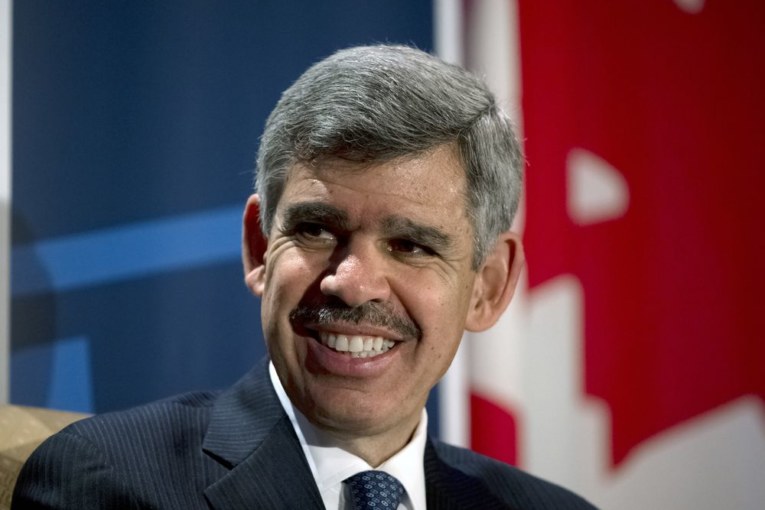
Calgary business leaders had the rare opportunity to hear Mohamed El-Erian, among the world’s leading economists, issue his forecast for 2018 on Thursday night.
The Calgary event, hosted by the Chartered Financial Analyst Society in Canada, is annually the organization’s most successful. And this week’s gathering — its 41st — was likely among the best.
El-Erian is not bullish about oil prices.
It was as if he’d been given a preview of International Energy Agency numbers released Friday, which forecast U.S. crude production to not only reach record levels, but surpass Saudi Arabia and challenge Russia as the world’s largest oil producer.
The report also stated this rise in production — despite previous OPEC cuts and increased demand — was unlikely to be offset by drops in Venezuelan production or decline rates in other fields around the world.
El-Erian, chief economic adviser at Allianz, the corporate parent of Pacific Investment Management Company where he was CEO and co-chief investment officer between 2007 and 2014, cited the expected growth in production as a key reason oil prices are unlikely to continue rising.
Unlike past CFA dinners, El-Erian didn’t offer up an oil price forecast, which — in addition to returning to defend their forecasts the following year — is what speakers were once required to do.
He sees energy’s challenges as rising shale production, the discipline needed to maintain production cuts by the Organization of Petroleum Exporting Countries — including non-OPEC actors such as Russia — and the need to see demand increase.
El-Erian said the oilpatch should expect a stable or lower oil price, with one reason being OPEC’s resolve has not been tested at high oil prices. Expectations are that higher oil prices will encourage more shale drilling, and it’s hard to predict OPEC’s response to that.
If prices do rise, he suggested companies and governments treat it as a windfall, not a sign of things to come.
It’s therefore a good thing Finance Minister Joe Ceci was in the room Thursday.
Oil aside, El-Erian is bullish on the broader commodities space.
The current growth phase needs to be seen as different than what underpinned previous periods of economic gains because it is not financially driven, he said.
It is not underpinned by leverage or debt or unconventional monetary policy — such as the quantitative easing put in place in the wake of the 2008 financial crisis and only began to shift in 2017 — on the part of central banks, said El-Erian.
“There are signs of a virtuous cycle between consumption, investment and trade,” he said.
Among the reasons for the optimism is the fact pro-growth policies are in place that will benefit companies, households and consumers.
But it’s also important to understand some events did not occur in 2017, which has contributed to the current rosier outlook, he said.
These include the lack of a policy mistake by the U.S. Federal Reserve, the absence of trade disruptions despite the rhetoric on the Trans Pacific Partnership and the North American Free Trade Agreement, inflation rates that remain under thresholds established by central banks and bond yields not rising despite strong economic growth.
“Lots of things didn’t happen in 2017, that people expected or worried would happen, and ironically they were pro-growth,” said El-Erian.
What is happening, he said, is the T-Junction, a phenomenon El-Erian wrote about in his 2016 book, The Only Game in Town: Central Banks, Instability, and Avoiding the Next Collapse.
In the world of economics this describes a state where the turn an economy takes at a junction will determine whether it moves toward a period of real and inclusive growth, or one characterized by financial instability, protectionism and economic stagnation.
Judging from El-Erian’s comments Thursday, the global economy has turned toward inclusive growth, despite the rhetoric heard on a daily basis.
“The biggest engines of the global economy are all shifting up at the same time. If you look at the projections of various international organizations, they show that the overwhelming majority of countries in the world are experiencing higher growth,” said El-Erian.
For investors in the room, his perspective was that valuations — with the exception of oil — will be supported by economic growth. The oil price will depend on OPEC.
El-Erian offered three potential risks to his forecast — a deterioration in relations between North Korea and the rest of the world, upheaval in the Middle East and policy mistakes made by central banks, excluding the U.S. Federal Reserve.
One could make the argument that there is a fourth risk — the unpredictability of U.S. President Donald Trump and the consequences of his policy-by-tweet approach.
But there was nary a mention of Trump during El-Erian’s presentation, nor was there discussion about China’s economy and the potential risks associated with that country moving to be less export-driven more focused on domestic demand — and all the structural reforms that go along with making that happen.
To be fair, El-Erian didn’t have all night. And in the time he did have, he gave the audience plenty of data points and a comprehensive, if not wholly optimistic, analysis of what’s in store for the global economy in 2018.
Optimistic on all fronts, except energy, which is arguably what the Calgary audience really wanted to hear.
Deborah Yedlin is a Calgary Herald columnist
You can read more of the news on source
